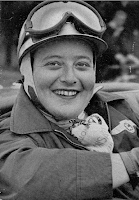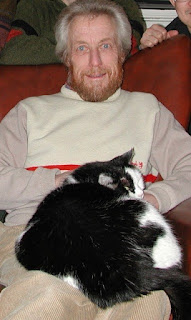Trans rights advocate and author Mark Rees, who died 26 July, was the second former Wren (member of the Women's Royal Naval Service) to transition.* The funeral was 23 August.
--
Mark (1942-23) was known for activism much later, not for being a 'lady Tar'. He was a WRNS driver 1962-64: a 'Motor Transport Wren'. **
I tried to interview him, for my book, Women in the Royal Navy, and then for an article on Trans seafarers. He never replied to my correspondence. I respected his choice - but regretted it.
His dad Hubert Rees, known as William, was a merchant seaman who became an officer. Mark wanted to go to sea too. But women in the WRNS were not allowed to do so in until 1990. It appears that he didn't consider joining the MN.
Mark's career as a Wren included being interviewed aboard Captain Scott's Discovery at the Embankment; trained at Burghfield, then at RNAS Culdrose, Cornwall; and later drafted to HMS Excellent in Portsmouth.
Mark was treated as a 'homosexual' when in the WRNS. At the time it was a homophobic organisation. The word 'trans' was barely used.
'I explained that it was my lack of femininity which posed more problems than my supposed sexuality,' Mark said in his autobiography (p56). 'Because of the lack of information, I regarded myself as some kind of "deviant" lesbian. I couldn't find another label.'
The Navy was far from understanding about diversity at that point. And some WRNS friends and officers were troubling too. But he was helped to a degree by:
# Ken, the RNAS Culdrose chaplain, with whom he remained in touch for 40 years
# the Senior Medical Officer at Culdrose, who nevertheleess 'was unable to offer any other hope regarding a "sex change". "No doctor would do that; he would regard it as a mutilation" . The doctor was obviously unware there had been two female-to-male changes in the 1940s UK.
# a kind psychiatrist at the Portsmouth naval barracks who wanted Mark to do psychoanalysis twice a week for two years. 'I couldn't understand what the point of it all was. They'd not succeed in making me feminine unless they gave me a brain transplant.'
# warmly supportive WRNS Second Officer Nancy Thomson 'was probably of more help than the psychiatrist . I remain indebted to her.' (Nancy went on to become Deputy Director of the WRNS in 1977, active in WRNS Benevolent Trust, and was always renowned for humanity).
# Netley Military Psychiatric Hospital, who labelled Mark 'homosexual' and recommended a medical discharge as 'I was never going to settle in the service ... [so] it was almost a relief.'
He transitioned in 1971 and published his memoir, "Dear Sir or Madam" (Cassell) in 1996. https://www.abebooks.co.uk/.../Dear-Sir-Madam.../plp. The WRNS bit is on pp50-67.
Other Wrens and diversity
*The first known Wren to transition was Stephen Davis, in 1961. Born in 1936 in rural County Durham. On marriage to a navy artificer this Wren found they could no longer pretend all was well in terms of identity. They and their husband split up.
 Stephen re-joined the WRNS, left again, and later transitioned F to M in the Royal Victoria Infirmary, Newcastle upon Tyne. Later they worked as a market clerk and planned to marry their cis girlfriend. No more is known.
Stephen re-joined the WRNS, left again, and later transitioned F to M in the Royal Victoria Infirmary, Newcastle upon Tyne. Later they worked as a market clerk and planned to marry their cis girlfriend. No more is known.** Other path-breaking 'Motor Transport Wrens' were the famous lesbian WW2 Wren Nancy Spain. (top pic). Later a broadcaster, Nancy(1917-64) was never formally out.
 Her partner was another Wren driver, publisher Joan Werner Laurie 1920-1964. (Middle pic) For a time Nancy and Joan had a triangular arrangement with racing driver Sheila Van Damm. (Lower pic).
Her partner was another Wren driver, publisher Joan Werner Laurie 1920-1964. (Middle pic) For a time Nancy and Joan had a triangular arrangement with racing driver Sheila Van Damm. (Lower pic).
If only Mark could have met them back them. His 1960s would have been a little easier.


